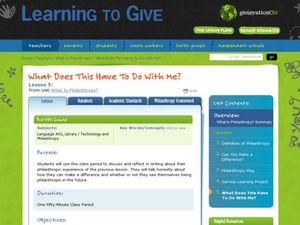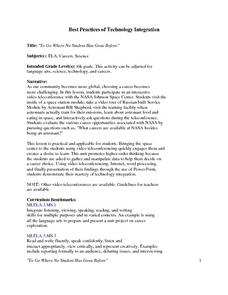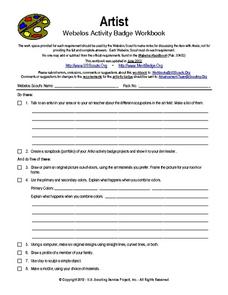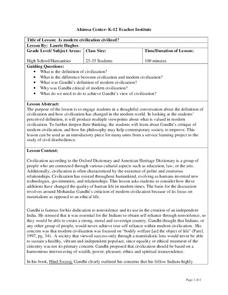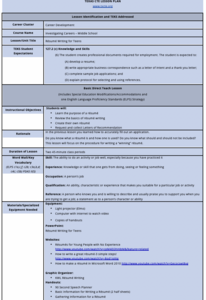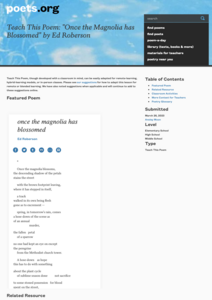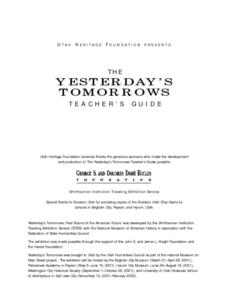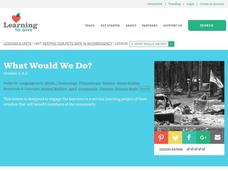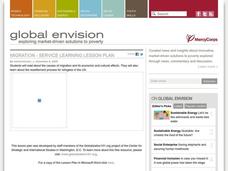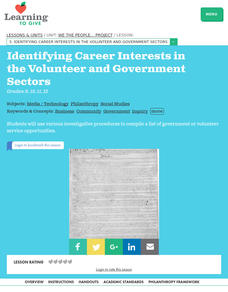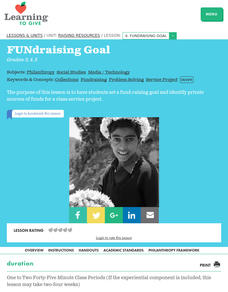Curated OER
What Does This Have To Do With Me?
Students examine how to make a difference in their community. In this philanthropy activity, students discuss if one person can make a difference, brainstorm a list of actions individuals can take to make a difference and write an essay...
Curated OER
Technology: Narrative Procedure Web Site
Pupils use Web page templates to publish how-to instructions on the Internet. The Web sites are used as instructional databases for others to view. Students also participate in electronic message boards to post and answer questions to...
Curated OER
To Go Where No Student Has Gone Before
Eighth graders participate in interactive video teleconference with employees of NASA Johnson Space Center. Students visit inside of space station module, take video tour of Russian-built Service Module by Astronaut Bill Shepherd, visit...
Curated OER
Rallying to the Cause
Students study the role of volunteering during the Civil War, the Reconstruction, and today. In this volunteerism lesson, students work with a partner to read biographies of volunteers while looking for their Core Democratic Values. They...
Curated OER
Artist Webelos Activity Workbook
In this art worksheet, learners complete a variety of art activities and keep track of them using the paper and additional web links are on the other page.
Curated OER
Map Your Area
Young scholars map the geographic boundaries of a recycling program's service areas and include the location of buyers important to the program. They use this map as an aid in managing a school recycling program or project.
Curated OER
HIV/AIDS, Friends & Families
Students examine what it might feel like to test positive for HIV. They listen to a guest speaker, conduct a role-play activity, identify positive actions to take, and design a panel for the AIDS quilt project.
Curated OER
Solar Cooking
Students create brochures focusing on one area of climate change that interests them. This lesson ends with a creative project building Earth Day solar cookers and having a class cookout.
Curated OER
Is Modern Civilization Civilized?
Students examine the concept of civility. In this modern civilization activity, students study Gandhi's teaching about the attributes of civilized societies and discuss how they can contribute to fostering civilization in their own...
Curated OER
Art & Culture Influence Each Other
Students compare and contrast the effects of culture upon the community and visa versa. In groups, students create Chumash style artwork and proportioned sculptures. They examine the perspective of the Renaissance Period and design...
Curated OER
Make a Difference
Learners review the previous lessons on the history of their city and county. Using their community, they identify issues in which they believe needs to be addressed. They develop their own plan of action and present their ideas to the...
Curated OER
Launching Your Ship with Citizenship Lesson 4: Hoisting the Flag
Students discuss the U.S. electoral process and brainstorm solutions to increase voter turnout in their community. In this democratic citizenship lesson, students identify keywords in speech and video related to freedom of speech and...
Curated OER
Beef
Addressing the intermediate skill of "Responsibility," this 4-H activity includes several activities to prepare your 4-H students. The activities include researching the Internet to find out the country where a list of beef cattle...
Texas Education Agency (TEA)
Résumé Writing for Teens
Writing a resume is as easy as 1-2-3. Teens learn the basics of resume writing by viewing a PowerPoint and completing a KWL chart. Next, they type and submit their resumes.
Academy of American Poets
Teach This Poem: "Once the Magnolia has Blossomed" by Ed Roberson
A free write, an image of magnolia leaves, and the Ed Roberson's poem "Once the Magnolia has Blossomed" ask scholars to use their noticing skills to reflect on the lesson beauty teaches about loss and grief.
Curated OER
Tasty Mapping
Students create an edible map. In this civics and geography lesson, students research their town's features and local government. Students work in groups to design and create a physical map of their town based on research.
Curated OER
Economics: The Scarcity Principle
Students discover how scarcity leads to economic choices. They examine its effect on individuals, business, and governments. Students simulate various scenarios to determine the role scarcity plays in each.
Curated OER
The Yesterday's Tomorrow Teacher's Guide
Young scholars explore the future and the importance of the past. In this futuristic lesson, students create a future city and identify traditions of their heritage that they feel should be passed on to future generations. They also...
Curated OER
One Person's Trash
Middle schoolers pick an area that needs cleaning up and help clean up the trash in that place. For this clean up lesson plan, students pick either their home, school, or neighborhood to clean up and sort through the trash that they find.
Curated OER
Keeping Our Pets Safe in an Emergency
Learners participate in a service learning project to benefit the members and animals in their community. In this animal welfare lesson, students review emergency preparedness. Learners discuss animal safety in an emergency. Students...
Curated OER
Migration
Students read sections from the Migration Issue Brief concerning why migration happens and the economic and cultural effects of migration. They study about the immigrant population in their own community.
Curated OER
Feel the Wonder
Students describe why clean water is important and how humans effect the quality of water in a community. They identify efforts in their community to keep the water clean. They participate in a water restoration movement in their area...
Curated OER
Identifying Career Interests in the Volunteer and Government Sectors
Learners create a list of service opportunities in their community. They identify their interests and research volunteer opportunities that they could do. They also complete a survey based on their experiences.
Curated OER
FUNdraising Goal
Students decide how much money is needed to help a family in their community. They develop a way to raise funds and follow through with the project. They identify private sources of funds in their community.


